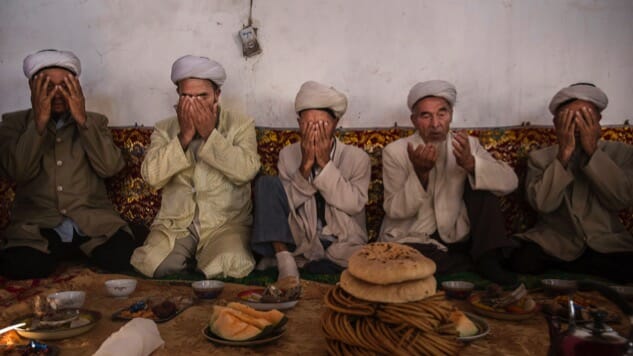China’s Islamophobia: Uighur Muslims, Authoritarianism and Worldwide Fear
Photo by Kevin Frayer
As the ethnic minority Uighur Muslims in China face increased discrimination from the Chinese government, various outlets estimate there are around 300 Uighur Chinese natives fighting for jihad with ISIS in Iraq and Syria. The ostracized ethnic and religious group has repeatedly been confronted by persecution from the officially atheist Communist Party, which suggests the relationship between the ethnic Han dominated government and the Uighur people is a driving factor for ISIS tactics of radicalization and recruitment of Uighur Muslims.
The so-called Islamic State caliphate recently released a video threatening China with attacks at home, apparently as a retaliation for Beijing’s treatment of the demographic. The thirty minute propaganda piece said that the terrorists would “shed blood like rivers” in China. ISIS also killed a captive Chinese native in 2015. The video they released proclaiming war on China came on the same day the Chinese police held an armed rally in support of putting an end to national security threats in the province where Uighur Chinese live.
The Turkic speaking Uighurs—they’re more akin to Central Asian cultures than Han Chinese—come from the western-most autonomous province of Xinjiang, and is rich in natural resources for which it was a key stop along the Silk Road. Xinjiang shares their border with eight different countries including a small border with Afghanistan as well as a border on much of the porous and contested region of the Pakistani Kashmir. As the dominant Han ethnic group migrates into Xinjiang in response to the promise of prosperity, the ability for increased Uighur extremists to cross into the Middle East and join ISIS, as well as the possibility of terrorists entering China to attack domestically, are prevalent concerns as the threat of terrorism looms. The government seems to be heading towards a collision with Islamic militants by exacerbating the situation with their harsh rhetoric around keeping a single Chinese identity and eliminating the dangers of separatism, militant extremism, and terrorist activities.
Amidst consistent calls by President Xi Jinping for forging a single Chinese identity out of those who identify with a different cultural or ethnic nationality, the government in Beijing has issued warnings about extremism, calling for a “people’s war” against terrorism. There is a growing sentiment that Islam is becoming a larger problem for China, much like the rest of the world in its expanding Islamophobia. A top Party official, Sharhat Ahan, warned other political leaders in the Xinjiang province that the “international terror situation” is “destabilizing” China. The Communist Party has also increased surveillance and patrols in Xinjiang province while armed demonstrations have been consistently conducted “to declare war against terrorists.”
But the crackdown goes much further than rhetoric and political theatre, the government has banned fasting during Ramadan, prohibited long beards and Islamic headwear, restricted use of the Turkic language, forbid the call to prayer at government sanctioned and supervised mosques, and banned children under the age of 18 from entering their places of worship at all. Government security forces in Xinjiang killed 28 people in 2015, calling the people “terrorists.” Human rights groups contested the use of the nomenclature, saying Beijing has failed to provide suitable evidence that there is a foreign-directed terrorist organization working against the Chinese state. The Party also seized the Uighur population’s passports and are refusing to issue new ones, which therefore places travel restrictions on Uighurs in Xinjiang. With many residents saying that the Communist Party is warring on Islam, these laws are at the very least an addition to the lack of acknowledgement for the Uighur plight, culture and language. The attacks that have been carried out against China have been met with increased discrimination and persecution, aggravating the cyclical conflict between the minority group and the Han government.
-

-

-

-

-

-

-

-

-

-

-

-

-

-

-

-

-

-

-

-

-

-

-

-

-

-

-

-

-

-

-

-

-

-

-

-

-

-

-

-








































